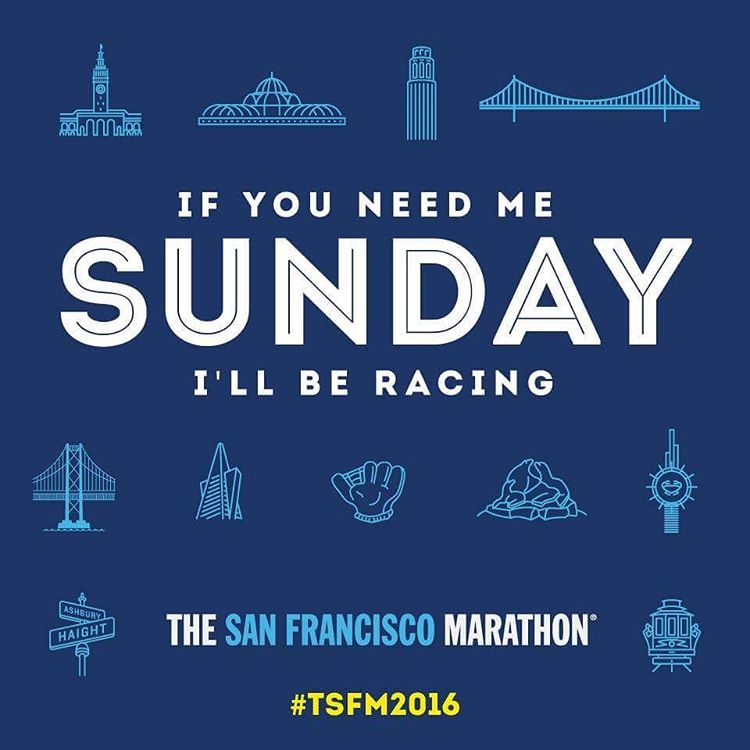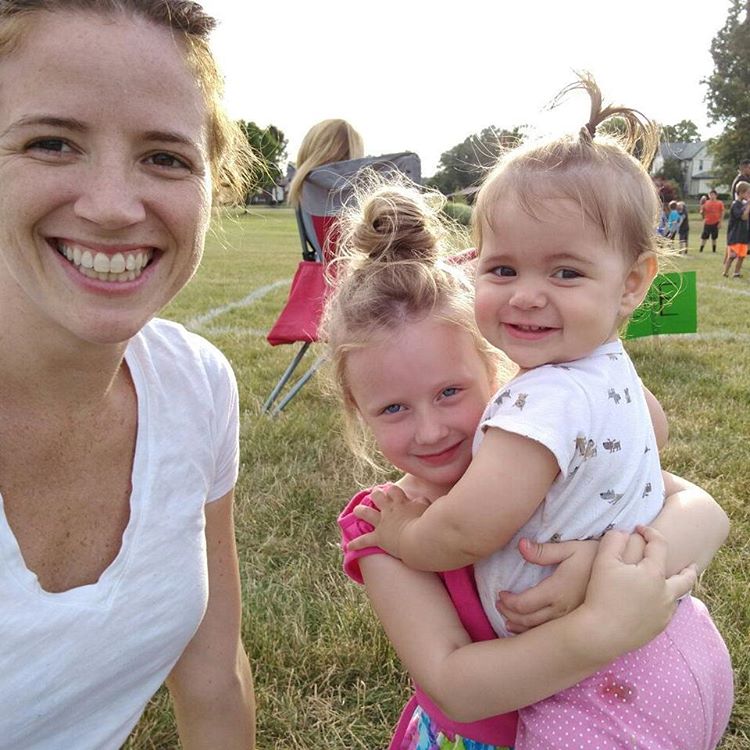the 2016 San Francisco Marathon race report – DNS
I’ve been in the marathon training and racing world since 2007, and during that time, I can count on one hand the number of races I’ve DNSed (did not start). They all had good reasons, and typically, I’ve decided to DNS well in advance of the race. A list, because lists are fun and make for easy reading on mobile devices:
- a Bastille Day 5k (or 8k?) in Chicago. reason missed: I wanted to go see Salman Rushdie speak at Harold Washington Library. While I didn’t get to hear Rushdie because I didn’t get there in time, I scored some autographed books instead, so I still consider this a win in my book (slow clap for that horrible pun).
- the Shamrock Shuffle 8k. reason missed: This was just a few weeks before my first Boston Marathon, and I took myself obnoxiously seriously and wanted to ensure that I was going into Boston as healthy as could be. The SS weather that year was for shit — we’re talking ankle- or calf-deep slushy, thick, nasty nonsense, with sideways snow and the whole shebang — and while I will gladly train in that before I get on a treadmill (true story … it’s not so much a pride thing as it is that I don’t like how treadmills make my body feel), I didn’t want to risk getting sick before my first Holy Grail of marathons.
- the Lakefront 50/50 (50k option) in ’08. reason missed: overtrained and ITB issues. I’m lucky a few weeks of reduced volume did the trick because I was head-over-heels in overtraining and ITB maladies.
- an 8k in Rockford, IL, over the summer just recently. reason missed: exhaustion. I lovingly blame my children, travelling, and humidity, that last one to which I have become wildly unaccustomed in the last three years.
- and finally: the ’16 SF Marathon. reason missed: fucking stomach flu that showed up on Friday morning at 4am, on race eve eve. boo hiss scorn

The girls and I returned to California from our midwest sojourn on Wednesday, and in terms of the cross-country travel, everything went swimmingly. On Thursday, I spent most of the day getting our life back in order by doing the usual mundane things like cleaning, groceries, and laundry, and everything was fine. I opted to take a rest day on Thursday instead of Friday because of how G had slept Wednesday night-Thursday morning, but nothing seemed too out of the ordinary.

Come Friday morning at 4am though, wow. I’m not one to shy away from TMI details about the gory details of anything, really, but suffice it to say that I had abdominal pain that literally took my breath away, and I spent the entirety of Friday daytime and evening in bed … or in the bathroom. For perspective: I don’t think I’ve ever called C at work and asked him to come home to watch the kids because I’ve felt so bad. It was ugly. I’m not a medical practitioner or a medical student, nor do I know the exact inner-workings of how our GI systems operate, but holy shit (bad pun, sorry, slow clap for that one for sure) I don’t think there was anything — anything — left in my system by Friday night.
In case you’re new to the marathoning scene, fully “emptying” your “system” 48 hours pre-race is basically the antithesis to how things are supposed to happen.
I was deliriously hopeful for things to turn around as quickly as possible because for as much as I love running TSFM — and as far as marathons go, it’s a hard course, and it’s hilly, but it’s beautiful, and SF in the summer is just unbeatable — I love the social stuff surrounding the weekend as well, the opportunities afforded to me by being a race ambassador and the opportunities I get to see SF friends I never get to see (hi, Erin!). Chicago-based friend Erica would be in town to race SF as an anniversary run of her first marathon, Portland-based Austin would also be in town … #yaddayaddayadda … I had a race to run and people to see! I knew in my heart of hearts, though, that even if I woke up on Saturday feeling like a million bucks, totally “free” of the gnarly-ass symptoms I had on Friday, that attempting to run, much less race, 26.2 challenging miles would be unwise. In fact, it would be idiotic. Thus, by 9am, I called it, told the people I needed to tell, and decided to DNS my first marathon, what should have been marathon #28, I think, and my three-peat of TSFM since 2010.
Admittedly, deciding to bag it was a tough decision. Aside from all the stuff I just elaborated on above, in the running world, it seems like social media has aggravated this bullshit notion of “no pain, no gain” or “doing it for the insta” (gag me) or whatever. I very much wanted to cover SF by foot, and I knew that I’d probably physically be able to, but for what? What do I have to prove — or to whom do I have to prove it — by running a marathon two days out from a nasty stomach bug that left me in bed and basically fasting all day long? A marathon is just that — a marathon — a distance you just can’t “gut out,” especially when said guts have been seemingly “gutted out” (I’ll be here all night) in the preceding days by a (probable) virus. This is all to say that I very well could have just sucked it up and slogged through the race, posted a pic on IG about how I had stomach flu 48 hours before the race and look at me! I have a marathon finisher’s medal around my neck! I am so badass and tough that I can go run a marathon feeling sub-par just for the hell of it! People do this shit every weekend on social media, and every weekend, other people applaud these people’s efforts and commend them for how much “stronger” they must be than they actually realize.
To this — to this seemingly unending cycle of “being badass” or “tough” or “having guts” and racing when you’re not well — when you’re physically unwell (having a virus or some other sickness) or FOR FUCK’S SAKE WHEN YOU’RE INJURED (“I’m pretty sure I have the beginnings of a stress fx. Doc, do you think I’m okay to race a marathon next weekend?” … the answer is unequivocally nooooooooo) — to all of this nonsense that no doubt feeds into the apparent reality that all runners get injured and that if you run, you will surely suffer from a running-related injury (or three) during your lifetime — I call bullshit. Please. Make it stop. Stop perpetuating this crap.
I’m probably being a bit crass about it, but I tend to think that runners self-divide into two camps — those who tend to think of their running in the long-term and those who tend to think of their running in the immediate — and more often than not, I feel like we in the running community are doing ourselves an enormous disservice by running (or by continuing to run) when we’re sub-par because for whatever reason, the immediate present matters more than the long-term. This isn’t to say that I think I’m higher and mightier for choosing to sit-out SF this year — see the paragraph above when I mention that it was a tough call for me; instead, I feel like if I want to continue to run at the volume I do (or higher), for as long as possible, it’s nothing short of imperative to think long-term. If we live and run solely in the here and now, we’re not being smart, gang, especially if you want to be doing this stuff for a long time. For me anyway, immediate gains absolutely pale in comparison to the long-term benefits I get from running and the goals that I have yet to realize. Perhaps you can relate.

Basically, if you take nothing else from this diatribe, take this. If you’re about to toe the line at a major running event, particularly those that are of the extremely strenuous and endurance variety (halfs, marathons, ultras), and you’re toeing the line not feeling 100%, ask yourself why you’re still there.
To whom are you proving?
Further, what are you proving, exactly?
If your BRF told you that she/he was suffering from the same thing that you are carrying at the starting line, would you advise him/her to still do the race?
And finally, how much are you willing to give up by completing this race?
If you’re running while injured or sick, how willing are you to take some possibly-significant steps backwards in training — due to further injury and/or compounded sickness — so you can complete (semantics here — complete, surely not compete in) this race?
Again, I wanted to share my experience here because I’m a normal gal who likes to run and race with the rest of us, and seeing my friends’ pics and hearing how fun race weekend was left me feeling a little deflated and gutted …
… until I realized that there’s always next year at SF and that there will surely be other marathons to run (I live in freaking CA, FFS. It’s like a veritable landmine for marathoning year-round). I totally get the sting that can come with money lost on race registrations, travel, and the like, but surely your long-term health, not to mention your ability to do this type of stuff in the first place, also matters. Like I admitted earlier, it can be a tough call.
Hopefully, you won’t get injured in advance of your race or contract a nasty bug that leaves you belly-up in the hours preceding your race, but if you do, please, for the love, have a chat with yourself (not weird, promise) about the race. I’m not a coach or a medical professional, but I will wager that chances are high that if you’re about to step into an endurance event feeling less-than, you will give yourself a hearty dose of humble pie during the race, if not also a hefty serving of totally-preventable-setbacks afterward. Maybe none of your friends want you to consider this reality, so let me. It’s probably not worth it. It wasn’t for me, anyway.